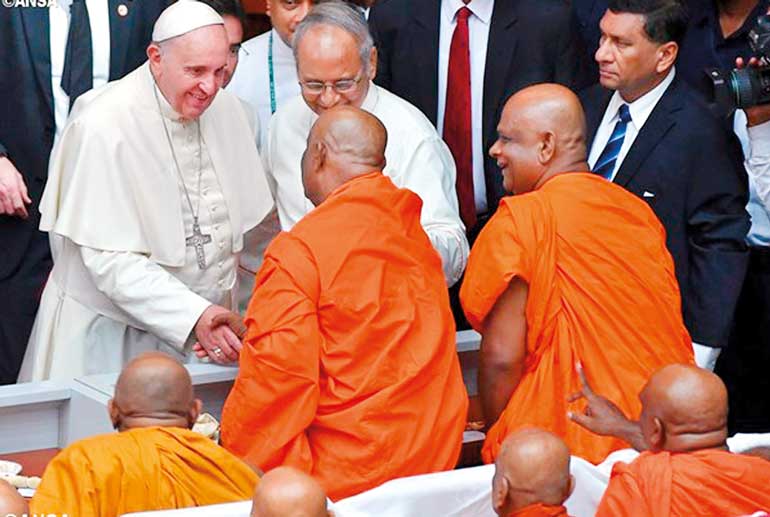Monday Feb 16, 2026
Monday Feb 16, 2026
Monday, 8 August 2016 00:01 - - {{hitsCtrl.values.hits}}

Pope Francis during an interreligious meeting at Bandaranaike Memorial International Conference Hall in Colombo - ANSA/File photo
Sri Lankan rights activists hope that the new constitution will afford citizens the freedom of religion, promote religious harmony and recognise human rights, but traditionalists want to keep the Buddhist hegemony.
“A secular state does not mean being irreligious,” said Father Sarath Iddamalgoda, a rights activist. “But an equal freedom for people to pursue their spirituality and faith without the obstacle of a constitution that guarantees only one religion which can sometimes assault others.”
“[The constitution should] promote harmony and co-existence amongst different religious communities,” the priest told ucanews.com.
Buddhism currently enjoys a privileged position guaranteed by the constitution. But that could change as the newly elected government drafts a new constitution amid calls to create equality for all religions within a secular state.
A statement dated August 3, 2016, signed by a group of Catholics said that it is their view that Sri Lanka should be a secular state that recognises, promotes and protects all universally recognised human rights.
“To us, a secular state is one that doesn’t give foremost place, prominence and privileges to one religion, constitutionally or in practice,” the statement said.
In Sri Lanka, 70% of the population is Buddhist compared with about 10% Muslim and 8% Christian.
“True liberty and freedom without harming others is a powerful witness for our short lifespan on this earth and a secular state gives us the freedom to live a spiritual lifestyle,” said Father Mangalaraja. “This should lead to an unbiased government with no hidden agenda, breed peaceful thought and behavior among people.”
Father Mangalaraja, President of the Justice and Peace Commission of the war-torn Jaffna Diocese, said equality must be given to all religions. “They [Buddhists] already take an upper hand,” he said adding that, in Jaffna, people are predominantly Tamils who might be Hindus or Christians.
Explaining the current problems faced by them, Father Mangalaraja said that in Trincomalee in the East and Jaffna in the North, the Sri Lankan army erected Buddha statues which are not easily removed leading to some discontent among the Tamil communities, who are predoiminantly Hindu.
Prominent Buddhist monk, Passaramulle Dayawansha Thero, Coordinating Secretary to the National Monk Conference, said that a non-religious state is a leftist idea. “Buddhism is accepted as the major religion by tradition and accepted as a characteristic of democratic society,” he said. “A country cannot exist without a religion. It is an attempt by a group of people who oppose this constitution. We should defeat the idea of the leftists.”
R. Nuhman, a Muslim rights activist, said that religion should be a private matter and no state law, rule or regulation should be based on it. “No religion will automatically be protected by state sponsorship,” said Nuhman.
“There still has been no justice for attacks on Muslim religious minorities in Aluthgama by Buddhist hardliners in 2014,” he said.
The violence caused three deaths, 88 injuries and hundreds of houses and business properties were looted and burned. “Buddhist extremists began their hate campaign against Muslims, Christians and Hindus a few years ago,” said Nuhman. (Source: http://en.radiovaticana.va/)